#american heathenry
Explore tagged Tumblr posts
Text
Potentially hot take, but I actually think it's really important for white witches and pagans to learn about black and brown spiritual practices (from practitioners of those traditions choosing to talk about what they're comfortable sharing with outsiders) not in a "I'm going to learn hoodoo!" kind of way but in a "these conversations are how we kill harmful stereotypes and learn how to be a good ally" kind of way.
#brought to you by me buying a new book on african american folkways today#witchcraft#witch#witchblr#pagan#paganism#paganblr#inclusive witchcraft#inclusive paganism#inclusive heathenry#mine
415 notes
·
View notes
Text
I am definitely also implicating myself when I say that heathens, especially American heathens, need to be more active in opposing racism within the heathen community. Our symbols and gods are being used as signs of hate and if we want to avoid losing the entire practice to hate groups, we need to not just say we’re anti-racist but also demonstrate it.
#norse paganism#forn sidr#norse heathenry#heathenry#american asatru#american forn sidr#anti-racist#inclusive heathenry#racism mention tw#i know this isn't groundbreaking stuff but I'm just so fed up with it#all heathens of color feel free to self promo
376 notes
·
View notes
Text
HEY YOU!
Are you religious and respectful??
Are you looking for a community?
Then come join the Xenia Station!
We are an inclusive, system, POC and LBGTQ+ friendly servers for pagans new or old, witchcraft practitioners, as well as luciferians, and satanists, Christians, Aboriginal faiths, Voudou, Hinduism, Buddhists, Jewish, Muslims, Atheists or Omnists who are simply curious, and Christopagans.
We also have channels for non-religious chatter, so you can have varied experiences here!
We are welcoming of other faiths as well, just make a suggestion in our suggestion channel and we’ll add it!
We are almost at 50 members 43/50 members!!
#religion#paganism#witch community#witchcraft#omnist#athiest#judaism#buddhism#satanism#theistic luciferianism#christopagan#christianity#muslim#islam#aboriginal#native american#native faith#judaisim#hinduism#voudou#celtic polytheism#celtic paganism#norse paganism#roman paganism#slavic pagans#slavic polytheism#hellenic pagan#germanic paganism#heathenry#pan africanism
29 notes
·
View notes
Text
Remember y'all: we have no concrete evidence as of now that the old Norse ever had facial markings at all, especially chin stripes! The only concrete evidence we have of chin stripes are on the Inuit of Greenland, Canada and Alaska, and they still wear it to this day despite it being prohibited for a long time, so let's encourage each other not to illustrate old Norse gods and people as having chin stripes out of respect for those Native Americans, at least until we find evidence the old Norse had chin stripe tattoos or markings.
instagram
"Angrboda" by R.N. Laing
artist website
54 notes
·
View notes
Note
Can I ask you your opinion about Asatru Alliance? I live in Italy and I'm starting to see some pagan organizations using Asatru Alliance as a trusted reference for Heathenry. I have my doubts, but it could be that something gets lost in translation.
And by the way, apparently Asatru Alliance reconstructed a day to celebrate Loki and Sigyn, the 31 of july? 🤔
The general answer I have here is to follow this rule of thumb:
Any American org that has the word "Asatru" in it is probably plagued by some bullshit, even if it's not the racist kind.
These orgs operate out of structures they inherited from their Folkish origins. Even if they are not Folkish now, most were established during a time when Folkish Heathenry was the only kind of Heathenry that existed in America.
One notable structure they inhereted was "whoever is in charge controls the narrative of Heathenry for everyone else." So if you want that narrative to change, you need to elect different leaders.
Even the Asatru Alliance admits it determines who it accepts based on whether the applicant is a "good fit" or not, basically admitting there's a norm of narrative-control in their ranks.
Having an authority control the narrative—even when it's a narrative you like—is antithetical to how Heathenry operates, where practices and customs emerge organically from people and culture, not from doctrines or religious authorities determining what's what. (We have a recent example of something new emerging in Heathenry, actually, in the form of Spongecake Day as a holiday for Loki.)
The Asatru Alliance is also basically the posterchild of what I call "Viking Christianity." They take the Norse gods and slot them into a Christian structure, treat the Eddas like holy books, treat the Hávamál like scripture, etc.
I don't know much about the holiday they reconstructed, but I do know many reconstructionists have a bad habit of treating the past as a doctrine to follow. Reconstructing the past can tell us a lot about how Heathenry was practiced in a given time and place, but using it as doctrine is, hilariously enough, very ahistorical—the Norse people didn't base their religion around what they discovered about their Bronze-Age forebearers, so why would we do the same?
Even if the Asatru Alliance didn't have the narrative-control aspect baked into their system, the org doesn't really strike me as one that understands Heathenry's religious architecture. After all, knowledge of Norse Studies is not the same as knowledge of theology.
So no, I wouldn't really trust them as a resource on Heathenry.
107 notes
·
View notes
Text
Info For Beginner Witches!
This is basically a masterpost for content relevant to new witches. A lot of it of it's stuff I wrote but I'll also link to material written by other people if I think it's useful.
Practice & Technique
Magical Correspondences 101
Closet Witchcraft: How To Get Witchy When You Can't Come Out Of The Broom Closet
How To Practice: Divination With Dice!
An approach to deity/entity work for the sort of people this sort of thing would work for
Manifestation Without Woo (a compassionate psychological approach to manifestation)
Non-Competitive Affirmations
No, you can't tell anything about a person from their natal chart.
A Brief Introduction to Energy Work
Energy Work On The Body: Hittin' The Right Spots For Tension Relief
Research & Critical Thinking
Information Literacy Basics
How to research
Distinguishing Fact, Opinion, Belief, and Prejudice
Critical Thinking: Definition, Examples, & Skills
Caution & Critical Thinking In Divination
10 Questions To Distinguish Real From Fake Science
Search for information on any witchy topic here!
"A weird thing just happened, does this mean anything? Is it an omen?"
Practicing discernment: Some ways of testing and ruling out the mundane
Research Tip: Remember the Five W's!
How conspiracy peddlers and cult recruiters make you feel like you're "thinking for yourself" when you're actually not
Remember a Previous Life? Maybe You Have a Bad Memory
Why fighting pseudohistory matters
Scams, Hoaxes, Conspiracy Theories, & Cults Everyone Should Know About
On people who assert "things are done this way for a reason!"
Dogmatism is not the solution to cultural appropriation
Some beliefs you might have to deconstruct as an ex-Christian
How the "divine feminine" and the "divine masculine" perpetuate patriarchy - and what we can do about it
Avoiding Harmful Stuff & Staying Safe
Recognizing the difference between real history and pseudohistory
Is the spiritual person a conspiracy theorist? A list of red flags
List of red flags to watch out for when joining a coven or online group
Beware of charisma mirrors
When your right to say no is entirely hypothetical
Dog whistles and symbols to watch out for
Eugenicist and bioessentialist beliefs about magic
What is spiritual eugenics?
Toxic Individualism In Modern Witchcraft
New Age beliefs that derive from racist pseudoscience
The Ancient Astronaut Hypothesis is Racist and Harmful
Allyship does not mean seeing yourself as worthless
The rules about responding to call outs aren’t working
History
Debunking the Pervasive Myths About Medieval Witch Hunts
Debunking Myths About Easter/Ostara
Just How Pagan is Christmas, Really?
The Origins of the Christmas Tree
No, Santa Claus Is Not Inspired By Odin
Why Prehistoric Matriarchy Wasn’t a Thing (A Brief Explanation)
Why Did The Patriarchal Greeks And Romans Worship Such Powerful Goddesses?
No, Athena Didn't Turn Medusa Into A Monster To Protect Her
Who Was the First God?
Were Ancient Civilizations Conservative Or Liberal?
PODCAST RECS - Debunking and Fact-Checking for Witches & Witchcraft Spaces
Angela's Symposium (YouTube channel about modern esotericism and witchcraft by Dr. Angela Puca)
ESOTERICA (YouTube channel about the history of Western esotericism by Dr. Justin Sledge)
ReligionForBreakfast (YouTube channel about religion run by Dr. Andrew Henry)
Let's Talk Religion (YouTube channel run by Filip Holm, lots of Islamic content but also lots of other stuff)
OceanKeltoi (Norse Heathenry)
Jackson Crawford (Norse Heathenry)
Conservation & Ecology
The Migratory Bird Treaty Act, Explained (all USian witches should read this, it most likely affects you)
How the Rage for Sage Threatens Native American Traditions and Recipes
(This post is unrebloggable because I plan to use it as a reference post to link, and may add/remove things to it over time.)
123 notes
·
View notes
Text

Today's topic is relatively serious, witches! Let's unravel the enchanting tapestry of Wicca, witchcraft, and paganism, shall we? While these terms are often used interchangeably, they each have their own unique traditions, beliefs, and practices. Here's a glimpse into their similarities and differences:
Wicca: Wicca is a modern pagan religion that was developed in the mid-20th century by figures such as Gerald Gardner and Doreen Valiente. It is centered around the worship of nature and the reverence of the divine, often symbolized by a god and goddess representing the masculine and feminine energies of the universe. Wiccans celebrate seasonal festivals, known as Sabbats, and honor the cycles of the moon in their rituals. Wicca emphasizes personal responsibility, ethical behavior, and the practice of magic as a tool for spiritual growth and transformation.
Witchcraft: Witchcraft, on the other hand, is a practice rather than a religion. It encompasses a wide range of magical traditions, beliefs, and practices that are rooted in ancient folk magic, shamanism, and occultism. Witches may or may not adhere to a specific religious belief system, and their practices can vary greatly depending on individual preferences and cultural influences. Witchcraft is often associated with spellcasting, herbalism, divination, and connecting with the energies of the natural world.
Paganism: Paganism is a broad umbrella term that encompasses a diverse array of spiritual traditions and practices that are rooted in pre-Christian, indigenous, or nature-based religions. Paganism honors the sacredness of the earth and the divine energies that permeate all living things. It includes traditions such as Druidry, Heathenry, Hellenism, and various forms of polytheism, animism, and pantheism. Pagans celebrate seasonal festivals, honor ancestral spirits, and cultivate a deep connection with the natural world.
While Wicca, witchcraft, and paganism share some common themes, such as reverence for nature and the practice of magic, they are distinct paths with their own beliefs, practices, and communities. Some practitioners may identify with one or more of these paths, while others may follow their own unique spiritual journey. Whatever path you choose, embrace the magic within you and follow your intuition as you explore the mysteries of the universe. 🌙✨

In the realm of spiritual practices and religions, some traditions are considered "closed," meaning they are intended for specific cultural or ethnic groups and are not open to outsiders or those who do not belong to those groups. The reasons for a tradition being closed vary and can include cultural preservation, respect for ancestral traditions, and the protection of sacred knowledge. Here are some examples of closed practices or religions and why they are considered as such:
Native American Spirituality: Many Indigenous tribes and nations have spiritual practices that are considered closed to outsiders. These traditions are deeply rooted in specific cultural contexts and are passed down through generations within tribal communities. Outsiders are often discouraged from appropriating or practicing these traditions out of respect for Indigenous sovereignty and the protection of sacred ceremonies and knowledge.
Vodou (Voodoo): Vodou is a syncretic religion that originated in Haiti and West Africa, blending elements of African spiritual traditions with Catholicism. It is considered a closed religion because it is deeply intertwined with Haitian culture and history and is traditionally practiced within specific communities. Outsiders are generally not encouraged to practice Vodou without proper initiation and training, as it involves working with powerful spirits and deities.
Shinto: Shinto is the indigenous religion of Japan and is deeply rooted in Japanese culture and history. It involves the worship of kami (spirits or deities) and the practice of rituals at shrines and sacred sites. While Shinto is open to participation by anyone, certain aspects of Shinto practice, such as the inner workings of Shinto priesthood and some shrine rituals, are considered closed to outsiders.
Certain forms of Witchcraft: Some forms of witchcraft, particularly those rooted in specific cultural traditions or lineages, may be considered closed practices. For example, some forms of African diasporic witchcraft, such as Hoodoo and Santeria, are traditionally practiced within specific cultural communities and are not open to outsiders without proper training and initiation.
It's important to approach spiritual practices with respect, humility, and sensitivity to cultural and historical contexts. While it's natural to be curious about different traditions, it's essential to recognize and honor the boundaries of closed practices and to seek guidance and permission from practitioners within those traditions before engaging with them.

In closed practices, certain aspects are not open for use or appropriation by individuals who do not belong to the specific cultural or ethnic groups associated with those practices. These aspects often include:
Sacred Rituals and Ceremonies: Closed practices typically involve sacred rituals, ceremonies, and rites that are deeply rooted in specific cultural or ancestral traditions. These rituals may involve working with powerful spirits, deities, or ancestors and are considered sacred and highly respected within the community. Outsiders are generally not permitted to participate in or appropriate these rituals without proper initiation and training.
Traditional Knowledge and Wisdom: Closed practices often involve the transmission of traditional knowledge, wisdom, and teachings that are passed down through generations within cultural communities. This knowledge may include spiritual beliefs, practices, herbal remedies, and magical techniques that are specific to the cultural context and are not meant to be shared with outsiders without permission.
Sacred Objects and Symbols: Certain sacred objects, symbols, and artifacts are considered sacred within closed practices and are used in rituals and ceremonies as vessels for spiritual energy or as tools for communication with spiritual forces. These objects may include ritual implements, sacred plants, and religious symbols that hold deep significance within the cultural context. Outsiders are generally not permitted to use or appropriate these objects without proper understanding and respect for their meaning and purpose.
Initiation and Training: In many closed practices, initiation into the tradition and proper training are essential prerequisites for engaging in spiritual practices and rituals. Initiation ceremonies often involve a formal process of acceptance into the community and may include teachings, rituals, and oaths of allegiance. Proper training under the guidance of experienced practitioners is necessary to ensure the safe and respectful practice of closed traditions.
Cultural Appropriation: Outsiders are cautioned against appropriating elements of closed practices without proper understanding, respect, and authorization from the cultural community. Cultural appropriation involves the unauthorized use, adoption, or exploitation of cultural elements by individuals who do not belong to that culture, often resulting in the distortion, commodification, or trivialization of sacred traditions and practices.
It's important to approach closed practices with humility, respect, and a willingness to learn from and honor the cultural context from which they arise. Seek guidance from experienced practitioners within the community and always ask permission before engaging with sacred rituals, objects, or knowledge.
I really recommend doing your own research of what is and isn't sacred or closed practices for the sake of your own reputation as well as for the sake of yourself. There are many good collections of information available. This website provides alternatives as well. This website also highlights the new interests in witchcraft recently and notes the closed and sacred practices and why.
#magickkate#reference#witchblr#witches#kitchen witch#sigils#witch#witchcraft#queue the magick#green witch#witchy#beginner witch#college witch#baby witch tips#baby witch#cottage witch#quarantine witch#college witch tips#witch aesthetic#witchcraft 101#witchcraft community#witch community#witches of tumblr#witch tips#witchtok#witchy vibes#witchy shit#witchyvibes
36 notes
·
View notes
Text
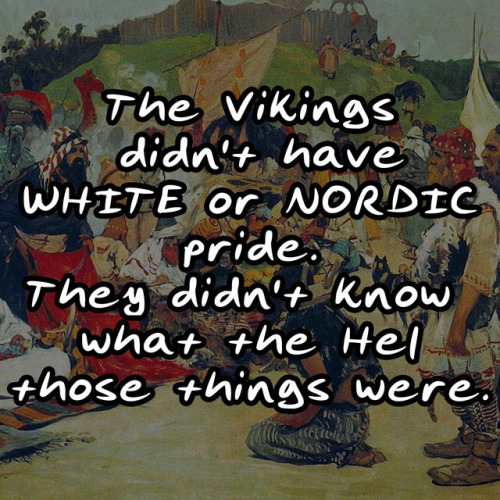
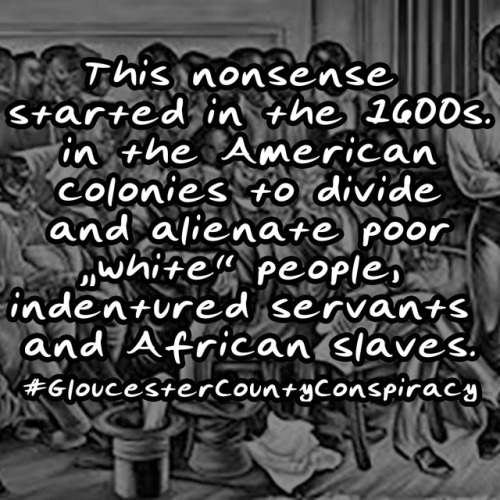
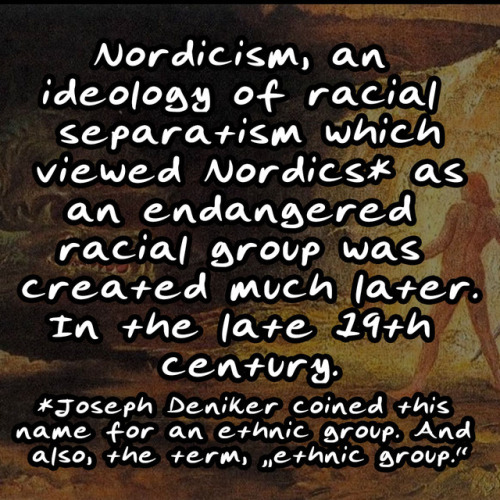
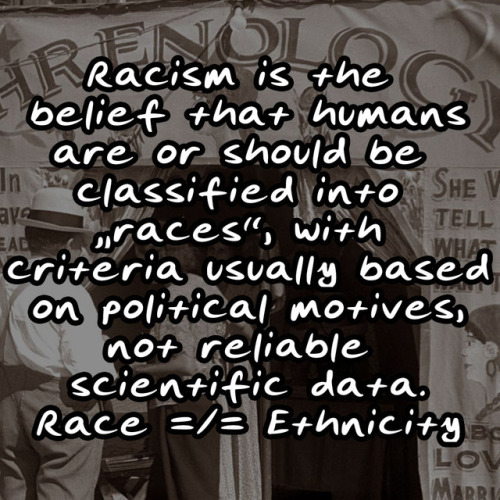

[Images with text overlay
Panel 1:
The Vikings didn’t have WHITE or NORDIC pride.They didn’t know what the Hel those things were.
Image: ‘Trade negotiations in the country of Eastern Slavs.’ (1909) By Sergei Vasilyevich Ivanov.
Panel 2:
Racism is the belief that humans are or should be classified into “races”, with criteria usually based on political motives, not reliable scientific data. Race =/= Ethnicity
Image: Phrenology Booth, Ohio 1938
Panel 3:
This nonsense started in the 1600s, in the American colonies to divide and alienate poor “white” people, indentured servants and African slaves.
#GloucesterCountyConspiracy
Image: A depiction of the Gloucester County conspiracy
Panel 4:
Nordicism, an ideology of racial separatism which viewed Nordics* as an endangered racial group was created much later.In the late 19th century.*Joseph Deniker coined this name for an ethnic group. And also, the term, “ethnic group.”
Image: Sigurd and Fafnir (1906)
Panel 5:
Such ideas from“racial science”grew in popularity and acceptance throughout the 20th and 21st centuries.
Image: Cartoon of Hitler with his trousers pulled down to reveal swastika boxers with the caption: LET’S CATCH HIM WITH HIS “PANZERS” down!
Image: Solid black background]
Some References:
ORIGIN OF THE IDEA OF RACE by Audrey Smedley, Anthropology Newsletter, November 1997
The Invention of the White Race, Verso Books
Europeans invented the concept of race as we know it, by Anjana Cruz
How America invented Racism — and Why you Don’t Have to Hate Black People to be a Racist, by Rachel Bjerstedt
Medieval history scholars are suddenly on the front lines in the fight against white supremacists , by Brent Bambury
We need to have a talk about Folkish Heathenry, by Grumpy Lokean Elder
What The Heathen Community Needs to Know by lokavinr
Wikipedia entry for Nordic race
Were Medieval People Racist?, The Public Medievalist
Some good tags contributed to the OP:
#Though racism wasn’t invented by the US #it was invented during the Enlightenment to justify the profits and economic growth of colonialism and slavery #Many of our ~Enlightenment Luminaries~ also contributed to building this execrable philosophy #something that has been deliberately overlooked in the teaching of philosophy for decades #It WAS greatly expanded upon and developed into a political philosophy in the US however
125 notes
·
View notes
Text
intro post, like if read

The Basics:
this is a side blog of @theonewhocounts
I'm 33 years old, white, transmasc genderqueer (they/he pronouns), and autistic.
this blog is for my spirituality. theistic Satanism, Anglo-Saxon heathenry, and eclectic paganism mostly, but I'm going to reblog all sorts of religious stuff that strikes my fancy or educates me about other faiths.
I am an anarcho-syndicalist and hold no frith with fascists. Radical inclusion or bust.
I do divination with tarot and oracle cards, dice, runes, and obsidian mirrors. Open for requests.
if you're interested in joining a small diverse discord server for theistic satanists of all sorts, hit me up for the invite link.
i tag answered asks with #ask
DNI, I guess?
Nazis, TERFs, antisemites, folkists, and any other such motherfuckers can fuck directly off into the sun.
Proselytizers of any stripe, including Christians who would like to convince me to "return to the Lord" or whathaveyou. No thanks.
I block porn blogs and fetish Satanists. Not because I don't like porn (I assure you, that's not the case) but because I don't want my devil-worshipping to be sexualized. Follow me from your non-porn accounts or don't follow me.
I block Lilith worshippers. I respect Judaism and Jewish culture as closed. Lilith is Not For Us. For full reasoning, see this ask.
The Somewhat Less Basics:
I'm white. My ancestry is predominately from Germanic and "British Isles", but I was raised entirely "privileged American WASP". Despite being exiled from that family and experiencing poverty and homeless as a teen and adult, my background shapes my worldview.
Given my settler-colonialist heritage, I make a conscious attempt to stay out of closed practices and appropriately honor the land upon which I live.
I was raised Anglican/Episcopalian, Lutheran, and Catholic (it's complicated).
I am an eclectic pagan and polytheist. I got started in paganism through genealogical research and an ancestral connection to Englisc/Anglo-Saxon heathenry (folkists GTFO) so most of my worship is conducted through that framework of practice.
I think most/all gods are real and powerful, but I am somewhat choosy about the ones I choose to honor and worship for myself. I suppose that makes me henotheist.
I am a theistic Satanist- I worship Satan as a god of rebellion and opposition, rejection of authoritarianism, justice, and forbidden knowledge (amongst other things). I worship several other gods and/or demons as aspects or very close counterparts of Satan. Further information can be found in this ask.
I venerate my ancestors and honor the spirits and wights of the land and the home.
I have no ill will towards Christians as individuals. Satan is the Adversary of the Christian god, however, and so there are things upon which Christians and myself will fundamentally disagree. And that's okay.
I hold some Buddhist practices & philosophy very close to my heart.
The Gods I Honor
Satanic “Pantheon”
Satan
Asmodeus
Azazel
Belial
Leviathan
Lucifer
Fyrnsidu (Englisc/Anglo-Saxon Heathen) Pantheon
Wōden
Frīg/Fréo
Ing
Thunor
Tīw
Sunne
Mōna
Herthe
Wada
Wuldor
Sceadu
I am more than happy to answer questions about my spirituality and what sorts of weird religious shit I get up to. Hit me up.

“Around us, life bursts with miracles--a glass of water, a ray of sunshine, a leaf, a caterpillar, a flower, laughter, raindrops. If you live in awareness, it is easy to see miracles everywhere. Each human being is a multiplicity of miracles. Eyes that see thousands of colors, shapes, and forms; ears that hear a bee flying or a thunderclap; a brain that ponders a speck of dust as easily as the entire cosmos; a heart that beats in rhythm with the heartbeat of all beings. When we are tired and feel discouraged by life's daily struggles, we may not notice these miracles, but they are always there.” -Thích Nhất Hạnh
#theistic satanism#anglo-saxon paganism#heathenry#satanic paganism#the gods#introduction#intro post#satanic worship#paganism#polytheism#satanism#diabolism#satanblr#dark aesthetic#my writing#OC
119 notes
·
View notes
Note
Does Alfred know about all the deals Arthur made/all the work Brighid, Rhys, and Alasdair put into spells to protect him and such? And if so, does he believe that it was needed, or does he think it was just them being superstitious? I guess the overall question is - he can't see the fae stuff, so does he know/believe he's ever been at risk from it? Or does he have no idea why he gets those superstitious urges beyond "it's how I grew up"?
He has this... very vague inkling. Not very much in the context of the supernatural or even the incredibly disturbing incidences of horror the tungsten baby attracted just by existing but in this very abstract way. Things were done for him because he was loved. He doesn't really think about if it was real or not, he doesn't want to think about if his eternal soul is tainted by magic and... existence as a nation. But he knows because Brighid has mentioned it in passing. When he's upset, especially in his somewhat rare moments of self awareness when she lived with him at various points, she's mentioned spells older than the language they are speaking woven into his very cradle. Hand on his cheek, still hoping for his future, looking him in the eye she speaks what is something like a spell in its own right. "You aren't just like your father. I've loved you since the moment I met you, it was as much my magic as your uncles that protected you. Don't forget that as you take my people and make them yours."
He attributes his childhood beliefs to his people. Early Americans were extremely superstitious and much of that superstition is what marked them as witches to the Calvinists who rejected most spirituality in their worship. Alfred is scared shitless of most magic, I think. He won't even use a ouija board and probably decried spiritualism and the mediums as unscientific heathenry. When his brother dances with the peasants on the eve of the solstice, jumping over fires hand in hand with Katya, Alfred does whatever the protestant version of crossing himself is. He would very much not like to believe in fae or witches or wizards, but he's an immortal dirt fuck who's caught glimpses of his father and uncles carving blood runes into the floor before the door was shut. It's something there, a part of him if he ever wanted to look for it. But his perception of himself is counter too all of that so he doesn't dig much.
#fairybait || baby alfred being chunky and cursed#alfred || o beautiful for spacious skies#historical inaccuracy? in my historical fantasy? more likely than you think#askbox prompts
37 notes
·
View notes
Text
Why Heathenry Doesn’t Work (In My Opinion)
This might make a few people mad but what doesn’t these days?
Suffice to say, I cannot stand reconstructionist ideas in polytheism but I can only speak for Norse polytheism. I cannot speak for Greek or Celtic – though I suspect Celtic is the same way – but as a former heathen it just grinds my gears.
One thing that I cannot identify with is the cultural aspect of what heathens may have been before Christians took over and what they are now. These two things cannot be seen as equals whatsoever. We cannot go back in time and reproduce a culture that was back then because we know nothing about how the Gods were worshiped, what standards They were held to, much less how relatable They were at the time.
We are not from the time before Christianity spread over Scandinavia. And the majority I’m speaking to are American much less Scandinavian. Any historical analysis of what might have happened in the halls of the ancient polytheists and how they honored their Gods is not at all what it’s going to be like in this modern era, much less this very Western-influenced, late capitalist era where Christians are still the ones calling the shots and pagans are still floundering trying to find answers to something they know little about.
We have no context for polytheism whatsoever in our culture. We hardly even have anything remotely pluralist, anyway. We have nothing to replicate, no practice to go off of, and no understanding that isn’t at least somewhat Christian. And yet, we try to go back to the way things were before all of this if only because there is no other way.
You can read the rest of this post here:
#devotional polytheism#mysticism#norse polytheism#paganblr#deity work#norse gods#norse paganism#deity worship#lokean#norse loki#deity communication#deity#norse heathen#norse pagan#norse pantheon#pagan#opinion#don’t come for me#to be honest I’ll probably ignore you if you do#heathenry#loki worship#polytheism#reconstruction
6 notes
·
View notes
Text
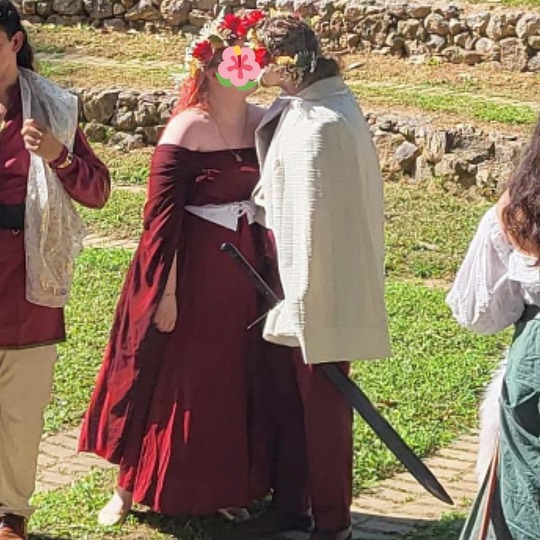
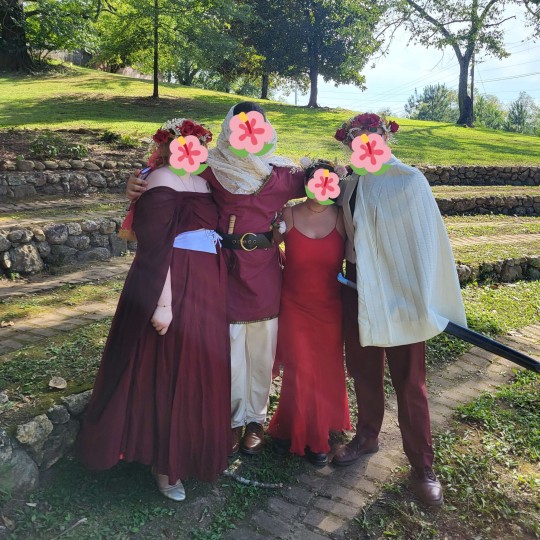
On Lughnasa (August 1st), 2023, under a full moon in Aquarius, my partner and I got married in a handfasting ceremony.
We designed this ceremony from scratch ourselves, incorporating elements from our own faiths. My personal practice is a mix of Heathenry and Reclaiming (and, ngl, is heavily influenced by Wicca) and my now-husband is Roman pagan. We also both have Irish American heritage that is important to our families, which is why we chose to incorporate historic Irish elements.
And our boyfriend was our officiant!
#the great handfasting project#handfasting#wedding#pagan wedding#heathenry#heathen#inclusive heathenry#reclaiming#reclaiming witch#irish polytheism#irish paganism#religio romana#roman paganism#roman polytheism#polyamory#queer#queer wedding#mine#personal
69 notes
·
View notes
Text
youtube
Why is Loki so Controversial? | Analyzing Loki's Myths Patreon: https://ift.tt/xeDCvEt Twitch: https://ift.tt/8erj13x Instagram: https://ift.tt/adBq8K7 Twitter: https://twitter.com/OceanKeltoi Intro Assets by: https://twitter.com/SYNJE_Grafx Discord: https://ift.tt/pMYcvWB Merch: https://ift.tt/4WPy2uh music by Karl Casey @ White Bat Audio Further Videos Hel: https://youtu.be/ktEdpreG2mg Fenrir: https://youtu.be/A0dNasvVewk Jormungandr: https://youtu.be/RnOrlpKDIyE The Werebear: https://youtu.be/-gah9gn0r8A Loki Playlist: https://www.youtube.com/playlist?list=PLax7iUZLpeuYdVyYpHISz2mEosQxu7rQN Do You Fear Death Playlist: https://www.youtube.com/playlist?list=PLax7iUZLpeuYfMDzf44tr2pXRDy3wP-tp Gods of Heathenry: https://youtu.be/Flb2a3W2V5A Hermodr: https://youtu.be/iU-gMUqiG5c Hodr: https://youtu.be/M6pPxdUgpTg Vali and Vidarr: https://youtu.be/od3YoVRcvRw Viking Soul: https://youtu.be/PmQb8qZk-qg Sif: https://youtu.be/PagTuagWhN4 Idunn: https://youtu.be/0sgLNVFZG9k Norse Afterlife: https://youtu.be/qKB1Gm3eV6Y Viking Heaven: https://youtu.be/_wJH33VrEPw Sol and Mani: https://youtu.be/e2YmvQUmeZ8 Njordr: https://youtu.be/6qDNTs3XG9o Freyr: https://youtu.be/N5norUmt7mE Thor in GoW: https://youtu.be/Jo3P_RbCZ3c Thor's Hammer: https://youtu.be/ck49KRxWZtQ Latent Christianity: https://youtu.be/ShvzwpsQL0c Original Latent Christianity vid: https://youtu.be/OvppWXJvPqA Further Reading - Loki in Scandinavian Mythology - Anna Birgitta Rooth - Loki and Sigyn - Lea Svendsen - Norse Myths That Shape the Way We Think - Carolyne Larrington - God in Flames, God in Fetters - Stephen Grundy - Our Troth: Volume 2: Heathen Gods - Ben Waggoner (3rd Edition) - Dictionary of Northern Mythology - Rudolf Simek - Norse Mythology: A Guide to the Gods, Heroes, Rituals, and Beliefs - John Lindow - Murder and Vengeance Among the Gods: Baldr in Scandinavian Mythology - John Lindow - Myth and Religion of the North - EOG Turville-Petre - American Heathens - Jennifer Snook - The Pre-Christian Religions of the North: History and Structures - Jens Peter Schjødt, John Lindow, and Andrén Anders - The Poetic Edda - Edda - Snorri Sturluson - History of the Danes - Saxo Grammaticus - The Saga of King Hrolf Kraki - Eyrbyggja Saga - Gisli Sursson's Saga - The Saga of the Confederates - Njal's Saga 00:00 - Intro 00:21 - The Problem & Nature of Loki 04:00 - [The Positive Myths of Loki] 04:27 - The Blood Oath - Lokasenna 07:20 - Thor in a Wedding Dress - Þrymskviða 11:30 - Loki vs Logi - Gylfaginning 13:40 - Loki the Creator - Völuspá 17:55 - [The Negative Myths of Loki] 18:36 - Thor vs Geirrod - Skáldskaparmál, Þórsdrápa & Gesta Danorum 24:23 - Loki Hates Goats - Hymiskviða & Gylfaginning 26:16 - Baldr's Mistletoe Allergy - Baldrs draumar, Gylfaginning & Gesta Danorum 32:26 - Loki Talks Shit - Lokasenna 37:22 - Saxo's Bound Útgarða-Loki - Gesta Danorum 45:10 - Loki the Father of Monsters - Angrboða, Bera, and the Saga of King Rolf Kraki 49:00 - Ragnarok - Völuspá & Gylfaginning 54:12 - [The Grey Myths of Loki] 54:50 - Making Asgard Great Again - Gylfaginning 58:08 - You Otter Not Done That - Skáldskaparmál & Völsunga saga 01:01:25 - Sif's Bad Hair Day - Skáldskaparmál 01:04:51 - Curious Apples and Shifting Nuts - Skáldskaparmál 01:10:56 - The Character of Loki 01:18:07 - Lokeans & Modern Praxis via YouTube https://www.youtube.com/watch?v=r4Tk_vBthJE
3 notes
·
View notes
Text
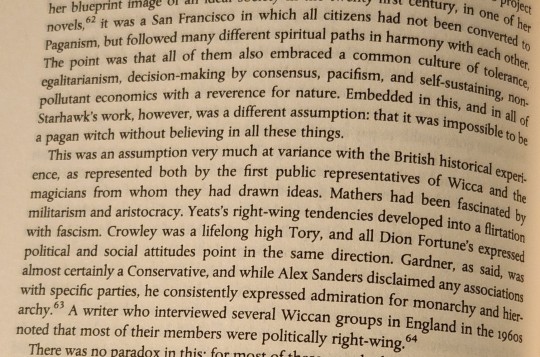
I wanted to post this entire page but the camera wouldn't let me so here are a couple paragraphs comparing American (particularly Starhawk, in this case) witchcraft (left-leaning) with the development of the craft in Britain (primarily right-wing).
It's interesting that Heathenry is basically the opposite (conservative in America, associated with the left in countries like Iceland).
4 notes
·
View notes
Text
Freyja’s Falcon Flights: To Make A Choice
I think I only did one of these last year, in September near the Autumnal Equinox, after getting the nudge from Freyja. I had thought that I would do them at the waxing quarter before the solstice and the waning moon after, from the Vernal Equinox through the Autumnal, but Bé Chuille stepped forward and asked for larger monthly workings, so I’m now doing those every waning quarter and I’ll be doing all the Falcon Flights on the waxing quarter. That’s honestly a little easier to keep track of, anyways!
So, just as a reminder, these Falcon Flights are journey paths Freyja guides me through that I am then supposed to share with those in my community. If you’re here reading this and it resonates, great! You’re part of that community. You don’t have to be a devotee or Freyja already (though you do need to be open to at least a small working relationship) and you don’t have to identify as Heathen and you don’t have to live nearby.
On the other hand, if these don’t work for you or aren’t your jam or just don’t resonate even if you are Heathen or a Freyja devotee, that’s fine too - I’m not the pagan pope! You don’t have to be part of this particular community. We’re all part of many overlapping communities and I don’t expect this blog series to resonate for everyone who likes my blog for other reasons. This series is based on my own experiences and UPG and I don’t expect everyone to agree with me or have the same viewpoints. Just scroll on, or skip reading the week of the waxing quarter. No worries.
Just: no Nazis, bigotry will not be tolerated, and bad faith arguments will get you blocked. We support Declaration 127 and Queer Liberation and Decolonization around here, and with the current state of American Heathenry, I find it best to state all of that shit up front.
And now, with no further ado, here is the script for this month’s Falcon Flight. Before you begin, prepare an offering for Freyja.
Falcon Flight: To Make a Choice
Begin in stillness, and quiet, and darkness. Find your center, and align yourself with earth and sky. As you stare at the darkness behind your eyes, feel and see as mist swirls up from the ground, obscuring everything around you. After a moment, it begins to part, leaving you standing in a flowery meadow.
When you arrive in the meadow, take a moment to observe around you, turning until you see a path. At the entrance to the path are two shrubs, and as you move on that direction, you see trees as well. Shrubs give way to trees and undergrowth on either side of the path, getting taller and denser as you move onward, until they join overhead into an arch, forming a tunnel of trees that slopes downward, getting denser and darker.
Eventually, you notice that the path has become flat, and then it begins to rise. Now the trees are thinning again, branches giving way to brightness, and as the trees again give way to shrubs, you see a gate in front of a wide plain and beyond it, the great world tree. If you have any guides or guardians you wish to accompany you, ones who can join you in flight, call to them now, before you step through the gate and make your way towards the tree.
As you approach the World Tree, circle around it clockwise, until you see an opening beneath one of the great roots. Duck under this root and enter the tunnel beneath. There is hard dirt packed beneath your feet, and the entire tunnel seems to have been hewn from that same clay-rich dirt and sandstone. Not as many feet come this way — the floor is still rough in places, so watch your step as you continue forward. There are torches set into sconces in the rough hewn walls, and their light looks like fire but you feel no heat as we continue past, and you smell no smoke or pitch.
The tunnel curves gently and then begins to rise in a gradual incline, ending in a doorway, two huge stones on either side and capped with a third. Touch one gently as you step out into the fresh air — these are worn by the elements and smooth to the touch. If you look back to the entrance, you will notice that on this side, the tunnel leads into what looks like a large burial mound, standing alone in a large clearing, though the forest is slowly encroaching from all sides.
Smell the air — the pine sap scent is strong, and your nose can tell there is moving water somewhere nearby, even if your ears cannot yet hear it. Now you should continue, following a clear trail deeper into the forest. Your footfalls are muffled by pine needles, and the air seems still. The scent and after a while the sound of water is to your left as you walk, and after a short time, you arrive at a fork, with three paths to choose from.
One path curves to the left, and you can just make out a bridge over a creek in the distance. The one to the right seems to vanish into the trees. Continue down the middle path, which leads straight ahead. After a while, the trees seem to thin a bit, and the underbrush grows less tangled. There is a little smoke in the sky, above the rise of the hill, as though it comes from a hearth-fire, and you follow the path towards it.
As the path reaches the edge of the forest, and the pine needles give way to a large open field, your eyes are drawn to the great hall. It is large, and you know at once to whom it belongs. This is Freyja’s Hall, Sessrumnir, and you are in Folkvangr. Approach the door, and when the guard calls out his challenge, announce yourself and your purpose, and hand him the offering you brought for his Lady. He will give you a cloak in return. Put it on, and step inside.
Inside, the hall is dark, and folks wearing cloaks talk in hushed tones and whispers, gathered in small groups. If you would talk to Freyja today, approach the dais and speak.
When you are finished, move towards the closed door, opposite the one you came in. A cleric is there, to let you know when it is your turn. When they motion to you, move forward, and pull your cloak over your face so that it falls to your chin, obscuring your vision of everything except yourself and the floor. Open the door, and enter the room. Someone else is in here, but you can only see their dark robe and their two hands, outstretched. In each palm is an object. Choose one, and take it. If you speak to the person, they will answer, but you must make the choice before you can leave this room.
When you have chosen an object, you will be allowed to continue on. A door will open or a portal will appear - you may remove your hood and call to your guides to join you before you step through. What you find on the other side will be important, and personal, based on the object you chose.
…
When you are finished with your time in that other place, a trail of amber stones will begin to glow, illuminating a path back to Folkvangr and the path that will lead you back to the World Tree. You may stop at the hall along your way, if you wish. When you are ready to depart, go back the way you came: through the forest, to the mound, through the mound-tunnel and out from under the root, across the plain, and back to the gate, through the tunnel of trees, and back to the meadow. Then the mist will swirl up again, and take you back to your body.
7 notes
·
View notes
Note
Hey what's the deal with Thursatru? Something feels off about it to me...
You can ignore my last ask; I saw you answer someone else who had the same question
Well first for posterity: Thurs (or Tussar) are Jötun, and Jötnar are the wild, untameable forces of nature. But unlike most Jötnar, Thurs are wild to the degree that they are actively and decisively incompatible with human wellbeing.
They represent the most extreme and destructive phenomena of nature, like rockslides and volcanic eruptions—stuff you have no chance of surviving if you get caught in its path. The destructive nature of Thurs is where we get the meaning of the rune Thurisas from.
Folklore has it that Thurs commonly dwell where humans fundamentally cannot. Some are said to live in Jötunheimen national park, up where the mountain peaks are swallowed by the clouds and where nothing grows. They throw rocks down at people passing by.
They also live in the volcanos of Iceland (Muspelheim). Thurs such as Sutur are responsible for the destructive nature of volcanos, spewing fire, ash, and molten rocks, while cracking open the land during an eruption.
My understanding is that it's uncommon for people to venerate the Thurs, but not for any taboo reason. Rather, it's the same reason why we don't worship wild tigers; "worship" is not the kind of relationship that builds any rapport with them. For most people, their relationships with Thurs involve being cautious of their nature and staying out of their way.
This is the way Thurs are understood in folklore. Now, to understand what Thursatru is, and what its deal is, take everything I just said and throw it out the window.
"Thursatru," from what I've gathered, basically characterizes itself as the Satanism of Heathenry, and it only makes sense in relation to specifically the American flavor of Asatru.
Keep in mind not refering to all of Heathenry in America, but to the way Icelandic Ásatrú is interpreted by Americans: The Eddas are treated as scripture, the past is treated as doctrine, Valhalla is treated as the goal to aspire to (awarded to those who live by the "viking values" outlined in the Havamal, or the snake-oil known as the Nine Noble Virtues), and Odin is treated as the Supreme Being and Loki his adversary.
The phrase "Asatru"—meaning "true to the Aesir"—is viewed as almost like an oath of office. You are pledging yourself to the Aesir's "side" in a prophesized cosmic war, fought between the forces of Order (represented by the Aesir, especially Odin) and Chaos (represented by the Jötnar, with figures like Loki, Ymir, and Sutur).
Jötnar basically fulfill the same function in American Asatru that demons and devils do in Christianity. If Satanism is the worship of all that is antithetical to the Christian god and Christianity, then Thursatru is the worship of all that is antithetical to the Aesir and Asatru belief. By being Thursatru, you're choosing to oppose the Aesir, aligning yourself with the forces destined to fight against them during Ragnarok.
And yes, all of it is extremely corny.
None of Heathenry was ever like this, and much of American Asatru is Christianity in viking garb.
Rockslides are dangerous, but not evil. Volcanic eruptions are disastrous, but not evil. The natural processes of the world—processes that are essential for life on Earth—don't always align with our needs as individual organisms. In fact, some of these processes will always be to our detriment if we stand in their way, as is the case volcanic eruptions and rockslides. That is the Thurs. That is who they are and what they represent.
So basically, the thing that's "off" about Thursatru is that it exists as a reaction to the narrative of American Asatru, and actually legitimizes that narrative to the public eye because it conforms to the American Asatru claim that venerating the Thurs fundamentally opposes the Aesir.
It's not true though, and that logic doesn't check when you put Heathenry back into its own paradigm. Saying Thurs-venerating opposes the Aesir is like saying "Exploring volcanos means you fundamentally oppose the existence of human-friendly environments." Like, what.
The only thing that actually makes someone Aesir-opposing, is their stance of opposing the Aesir. Venererating Thurs just makes someone Norse Heathen.
It's shenanigans all the way down.
82 notes
·
View notes